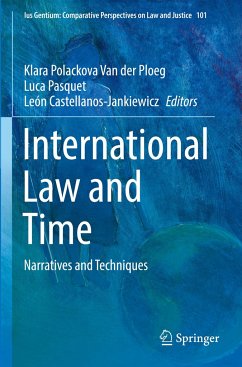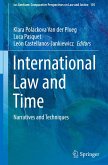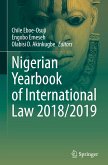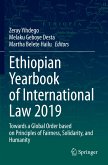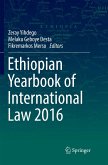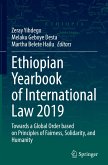International Law and Time
Narratives and Techniques
Herausgegeben:Van der Ploeg, Klara Polackova; Pasquet, Luca; Castellanos-Jankiewicz, León
International Law and Time
Narratives and Techniques
Herausgegeben:Van der Ploeg, Klara Polackova; Pasquet, Luca; Castellanos-Jankiewicz, León
- Broschiertes Buch
- Merkliste
- Auf die Merkliste
- Bewerten Bewerten
- Teilen
- Produkt teilen
- Produkterinnerung
- Produkterinnerung
This book explores the close, complex and consequential - yet to a large extent implicit - relationship between international law and time. There is a conspicuous discrepancy between international law's technical preoccupation with the mechanics of temporal rules and the absence of more foundational considerations of how time - both as an irrepressible physical dimension manifesting in the passage of time, and as a social construct shaped by diverse social and cultural factors - impacts and interacts with international law. Divided into five parts and 21 chapters, this book explores key…mehr
Andere Kunden interessierten sich auch für
![International Law and Time International Law and Time]() International Law and Time123,99 €
International Law and Time123,99 €![Nigerian Yearbook of International Law 2018/2019 Nigerian Yearbook of International Law 2018/2019]() Nigerian Yearbook of International Law 2018/2019116,99 €
Nigerian Yearbook of International Law 2018/2019116,99 €![Ethiopian Yearbook of International Law 2019 Ethiopian Yearbook of International Law 2019]() Ethiopian Yearbook of International Law 201977,99 €
Ethiopian Yearbook of International Law 201977,99 €![Nigerian Yearbook of International Law 2017 Nigerian Yearbook of International Law 2017]() Nigerian Yearbook of International Law 201777,99 €
Nigerian Yearbook of International Law 201777,99 €![Ethiopian Yearbook of International Law 2016 Ethiopian Yearbook of International Law 2016]() Ethiopian Yearbook of International Law 201677,99 €
Ethiopian Yearbook of International Law 201677,99 €![Nigerian Yearbook of International Law 2018/2019 Nigerian Yearbook of International Law 2018/2019]() Nigerian Yearbook of International Law 2018/2019116,99 €
Nigerian Yearbook of International Law 2018/2019116,99 €![Ethiopian Yearbook of International Law 2019 Ethiopian Yearbook of International Law 2019]() Ethiopian Yearbook of International Law 2019106,99 €
Ethiopian Yearbook of International Law 2019106,99 €-
-
-
This book explores the close, complex and consequential - yet to a large extent implicit - relationship between international law and time. There is a conspicuous discrepancy between international law's technical preoccupation with the mechanics of temporal rules and the absence of more foundational considerations of how time - both as an irrepressible physical dimension manifesting in the passage of time, and as a social construct shaped by diverse social and cultural factors - impacts and interacts with international law. Divided into five parts and 21 chapters, this book explores key aspects of the relationship between international law and time and puts the spotlight on time's fundamental significance for international law as a legal order and as a discipline. Pursuing diverse approaches to international law, the authors consider the notion, significance, manifestations, uses and implications of time in international law in a wide range of contexts, and offer insightsintothe various ways in which international law and international lawyers cope with time, both in terms of constructing narratives and in devising and employing particular legal techniques.
Produktdetails
- Produktdetails
- Ius Gentium: Comparative Perspectives on Law and Justice 101
- Verlag: Springer / Springer International Publishing / Springer, Berlin
- Artikelnr. des Verlages: 978-3-031-09467-5
- 1st edition 2022
- Seitenzahl: 488
- Erscheinungstermin: 17. Dezember 2023
- Englisch
- Abmessung: 235mm x 155mm x 27mm
- Gewicht: 733g
- ISBN-13: 9783031094675
- ISBN-10: 3031094670
- Artikelnr.: 69491292
- Herstellerkennzeichnung Die Herstellerinformationen sind derzeit nicht verfügbar.
- Ius Gentium: Comparative Perspectives on Law and Justice 101
- Verlag: Springer / Springer International Publishing / Springer, Berlin
- Artikelnr. des Verlages: 978-3-031-09467-5
- 1st edition 2022
- Seitenzahl: 488
- Erscheinungstermin: 17. Dezember 2023
- Englisch
- Abmessung: 235mm x 155mm x 27mm
- Gewicht: 733g
- ISBN-13: 9783031094675
- ISBN-10: 3031094670
- Artikelnr.: 69491292
- Herstellerkennzeichnung Die Herstellerinformationen sind derzeit nicht verfügbar.
Klara Polackova Van der Ploeg is an Assistant Professor at the University of Nottingham School of Law and an attorney-at-law specializing in international law and international dispute settlement. She completed her PhD, summa cum laude avec les félicitations du jury, at the Graduate Institute of International and Development Studies in Geneva and received the 2019 SNIS Award for her research. She was previously an associate with leading law firms in London and Prague and served as a judicial assistant to Judge Sir Christopher Greenwood CMG QC at the International Court of Justice. She is a Member of the Nottingham Centre for International Law and Security, the Human Rights Law Centre and the University of Nottingham Commercial Law Centre. Luca Pasquet is Assistant Professor in Public International Law at Utrecht University School of Law, and Researcher at the Utrecht Centre for Accountability and Liability Law (UCALL). León Castellanos-Jankiewicz is Researcher in International Law at the Asser Institute for International and European Law, The Hague. He is also Academic Coordinator of the Netherlands Network for Human Rights Research.
Chapter 1. The Multifaceted Notion of Time in International Law (Klara Polackova Van der Ploeg).- Part I. Constructing and Attributing Meaning to Time in International Law.- Chapter 2. Lawyers as Creators of Law's Temporal Reality: A Pragmatic Approach to International Law (Eric Wyler).- Chapter 3. Human Rights in Time: Temporalization of Human Rights in Historical Representation (Juhana Mikael Salojärvi).- Chapter 4. Interstellar Justice Now: Back to the Future of International Law (Bérénice Kafui Schramm).- Chapter 5. Digressing Towards Justice: International Criminal Law's Narrative of Moral Transit Through Violence (Timothy Waters).- Part II. Time in International Lawmaking.- Chapter 6. How Instant and Universal International Law is Born and How it Dies: The 1856 Declaration of Paris (Jan Martin Lemnitzer).- Chapter 7. Incrementalism in Lawmaking: The Development of Normative Frameworks of Protection for ForciblyDisplaced Persons (Rob Grace).- Chapter 8. The Politics of Time in Domestic and International Lawmaking (Tommaso Soave).- Chapter 9. Life Cycles of International Law as a Noetic Unity: The Various Times of Law-Thinking (Thomas Schultz).- Part III. Time and the Operation of International Law.- Chapter 10. Time-Travelling Rules of Interpretation: Of 'Time-Will' and 'Time-Bubbles' (Panos Merkouris).- Chapter 11. Time and Tide Wait for No One: The Curious Consideration of Time in International Investment Treaty Law (Robert Howse).- Chapter 12. The Relevant Time for Assessing Jurisdiction: The International Court of Justice and the Ratione Temporis Objection in the Genocide (Croatia v. Serbia) Case (Lorenzo Palestini).- Chapter 13. Of Relevant Dates and Political Processes: State Succession and the Dissolution of the Former Yugoslavia (Asier Garrido-Muñoz).- Chapter 14. China, Confucian Time and International Law: A Normative and Behavioral Account (Matthias Vanhullebusch).- Part IV. International Law between Change and Stability.- Chapter 15. International Law Through Time: On Change and Facticity of International Law (Klara Polackova Van der Ploeg).- Chapter 16. The Development of International Law, Perception, and the Problem of Time (Gregory Messenger).- Chapter 17. Change and Adaptation in International Environmental Law: The Challenge of Resilience (Jaye Ellis).- Part V. Transformations of International Legal Concepts in Time: Continuity, Discontinuity, Recurrence.- Chapter 18. The 'Minimum Standard of Treatment' in International Investment Law: The Story of the Emergence, the Decline and the Recent Resurrection of a Concept (Patrick Dumberry).- Chapter 19. Peace Agreements Between Rupture and Continuity: Mediating Time in International Law (Philip Kastner).- Chapter 20. Overlooking Continuity: National Minorities and 'Timeless' Human Rights (León Castellanos-Jankiewicz).- Chapter 21. Self-determination as Ideology: The Cold War, the End of Empire, and the Making of UN General Assembly Resolution 1514 (14 December 1960) (Victor Kattan).
Chapter 1. The Multifaceted Notion of Time in International Law (Klara Polackova Van der Ploeg).- Part I. Constructing and Attributing Meaning to Time in International Law.- Chapter 2. Lawyers as Creators of Law's Temporal Reality: A Pragmatic Approach to International Law (Eric Wyler).- Chapter 3. Human Rights in Time: Temporalization of Human Rights in Historical Representation (Juhana Mikael Salojärvi).- Chapter 4. Interstellar Justice Now: Back to the Future of International Law (Bérénice Kafui Schramm).- Chapter 5. Digressing Towards Justice: International Criminal Law's Narrative of Moral Transit Through Violence (Timothy Waters).- Part II. Time in International Lawmaking.- Chapter 6. How Instant and Universal International Law is Born and How it Dies: The 1856 Declaration of Paris (Jan Martin Lemnitzer).- Chapter 7. Incrementalism in Lawmaking: The Development of Normative Frameworks of Protection for ForciblyDisplaced Persons (Rob Grace).- Chapter 8. The Politics of Time in Domestic and International Lawmaking (Tommaso Soave).- Chapter 9. Life Cycles of International Law as a Noetic Unity: The Various Times of Law-Thinking (Thomas Schultz).- Part III. Time and the Operation of International Law.- Chapter 10. Time-Travelling Rules of Interpretation: Of 'Time-Will' and 'Time-Bubbles' (Panos Merkouris).- Chapter 11. Time and Tide Wait for No One: The Curious Consideration of Time in International Investment Treaty Law (Robert Howse).- Chapter 12. The Relevant Time for Assessing Jurisdiction: The International Court of Justice and the Ratione Temporis Objection in the Genocide (Croatia v. Serbia) Case (Lorenzo Palestini).- Chapter 13. Of Relevant Dates and Political Processes: State Succession and the Dissolution of the Former Yugoslavia (Asier Garrido-Muñoz).- Chapter 14. China, Confucian Time and International Law: A Normative and Behavioral Account (Matthias Vanhullebusch).- Part IV. International Law between Change and Stability.- Chapter 15. International Law Through Time: On Change and Facticity of International Law (Klara Polackova Van der Ploeg).- Chapter 16. The Development of International Law, Perception, and the Problem of Time (Gregory Messenger).- Chapter 17. Change and Adaptation in International Environmental Law: The Challenge of Resilience (Jaye Ellis).- Part V. Transformations of International Legal Concepts in Time: Continuity, Discontinuity, Recurrence.- Chapter 18. The 'Minimum Standard of Treatment' in International Investment Law: The Story of the Emergence, the Decline and the Recent Resurrection of a Concept (Patrick Dumberry).- Chapter 19. Peace Agreements Between Rupture and Continuity: Mediating Time in International Law (Philip Kastner).- Chapter 20. Overlooking Continuity: National Minorities and 'Timeless' Human Rights (León Castellanos-Jankiewicz).- Chapter 21. Self-determination as Ideology: The Cold War, the End of Empire, and the Making of UN General Assembly Resolution 1514 (14 December 1960) (Victor Kattan).

